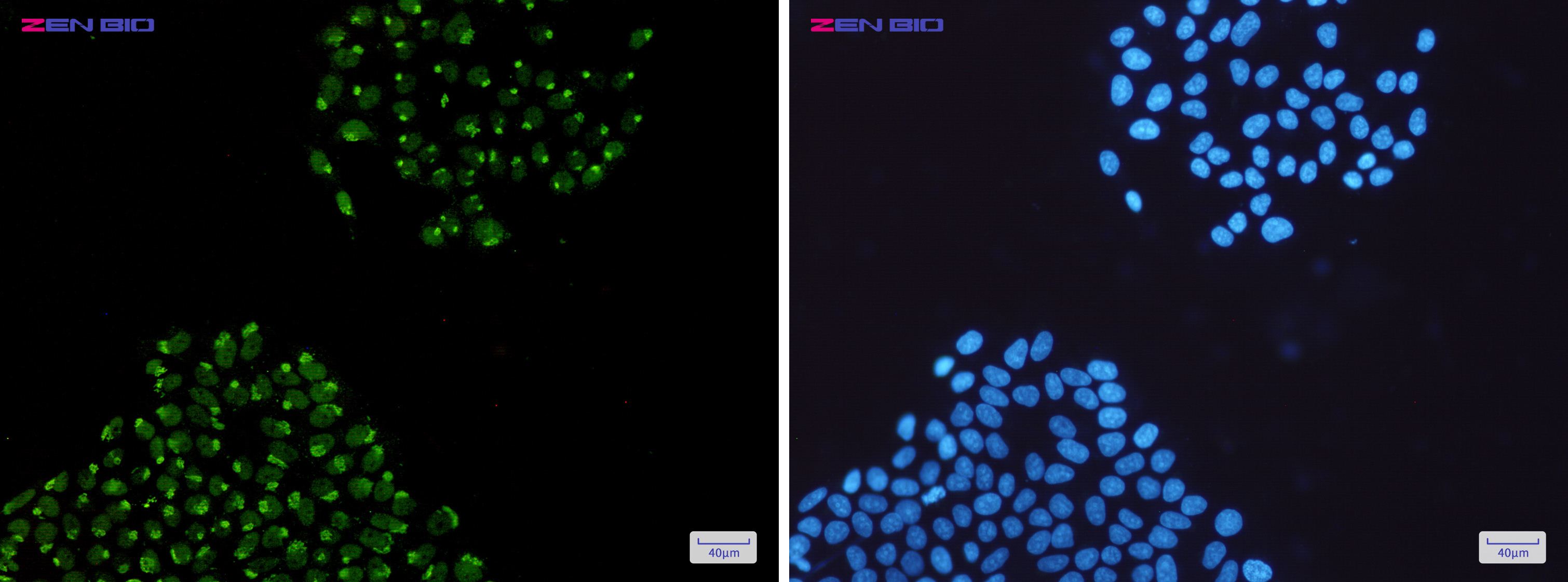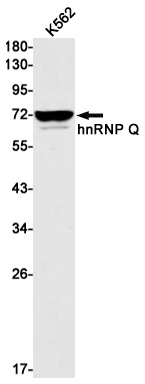-
Product Name
Anti-hnRNP Q Rabbit antibody
- Documents
-
Description
hnRNP Q Rabbit monoclonal antibody
-
Tested applications
WB, IHC-P, ICC/IF
-
Species reactivity
Human, Mouse, Rat
-
Alternative names
PP68; NSAP1; GRYRBP; HNRNPQ; HNRPQ1; GRY-RBP; hnRNP-Q antibody
-
Isotype
Rabbit IgG
-
Preparation
Antigen: A synthetic peptide of human hnRNP Q
-
Clonality
Monoclonal
-
Formulation
Supplied in 50nM Tris-Glycine(pH 7.4), 0.15M Nacl, 40%Glycerol, 0.01% sodium azide and 0.05% BSA.
-
Storage instructions
Store at 4°C short term. Aliquot and store at -20°C long term. Avoid freeze / thaw cycle.
-
Applications
1:2000-1:10000
1:20-1:50
1:50
-
Validations

Immunocytochemistry of hnRNP Q(green) in Hela cells using hnRNP Q Rabbit mAb at dilution 1/200, and DAPI(blue)

Western blot detection of hnRNP Q in K562 cell lysates using hnRNP Q Rabbit mAb(1:1000 diluted).Predicted band size:70kDa.Observed band size:70kDa.
-
Background
Swiss-Prot Acc.O60506.Heterogenous nuclear ribonucleoprotein (hnRNP) implicated in mRNA processing mechanisms. Component of the CRD-mediated complex that promotes MYC mRNA stability. Isoform 1, isoform 2 and isoform 3 are associated in vitro with pre-mRNA, splicing intermediates and mature mRNA protein complexes. Isoform 1 binds to apoB mRNA AU-rich sequences. Isoform 1 is part of the APOB mRNA editosome complex and may modulate the postranscriptional C to U RNA-editing of the APOB mRNA through either by binding to A1CF (APOBEC1 complementation factor), to APOBEC1 or to RNA itself. May be involved in translationally coupled mRNA turnover. Implicated with other RNA-binding proteins in the cytoplasmic deadenylation/translational and decay interplay of the FOS mRNA mediated by the major coding-region determinant of instability (mCRD) domain. Interacts in vitro preferentially with poly(A) and poly(U) RNA sequences. Isoform 3 may be involved in cytoplasmic vesicle-based mRNA transport through interaction with synaptotagmins. Component of the GAIT (gamma interferon-activated inhibitor of translation) complex which mediates interferon-gamma-induced transcript-selective translation inhibition in inflammation processes. Upon interferon-gamma activation assembles into the GAIT complex which binds to stem loop-containing GAIT elements in the 3'-UTR of diverse inflammatory mRNAs (such as ceruplasmin) and suppresses their translation; seems not to be essential for GAIT complex function.
Related Products / Services
Please note: All products are "FOR RESEARCH USE ONLY AND ARE NOT INTENDED FOR DIAGNOSTIC OR THERAPEUTIC USE"
